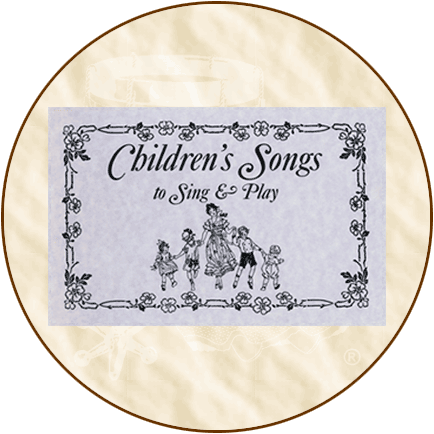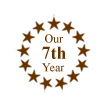.
Continued from product description
on Music Books' Page One...
Historical
Background: Children's songs are sung in every culture.
The songs in our collection feature American songs, an English
dance tune, other English songs, a French round, a Nigerian song,
plus Mother Goose rhymes in song,
Michael Row the Boat Ashore is an American Folk Song which
was written before the Civil War and sung by slaves in the Georgia
Sea Islands. The Michael in the song might be the archangel Michael
being called upon to help row during tough times. Attributed
to the Gullah people along the coastal islands in South Carolina,
the song became popular in the 1950s and 1960s and has been an
easy song for children to learn by rote and sing. It has also
been a great campfire song.
The origin of the tune used with Go Tell Aunt Rhody is from
a 1750 opera by Jean Jacques Rousseau titled "Le Devin du
Village." The tune became known as "Rousseau's Dream,
an Air with Variations for the Piano Forte" and was published
in 1881 by J. D. Cramer in Philadelphia. The words to Go Tell
Aunt Rhody were first published together in a Black Americana
book, "Play Songs of the Deep South" by Altona Trent-Johns
with illustrations by James Porter in 1944 by Associated Publishers.
The 15 songs in dialect included in this book feature directions
for dancing the folk dances that go with a particular song.
Pop! Goes the Weasel is a dance tune that was used in England.
As a dance tune, it had no lyrics other than the title, which
was used as the catch line of the dance. A couple would shout
out the words as they went under the arms of other dancers. The
tune was used for a country dance called The Haymakers and published
in Gow's Repository sometime between 1799 and 1820. After the
song lyrics appeared, other words emerged. A March 1860, issue
of the Southern Literary Messenger (Richmond Virginia) published
these words about the Queen of England:
Queen Victoria's very sick,
Prince Albert's got the measles.
The children have the whooping cough,
An pop! Goes the weasel.
Here are other other versions:
Half a pound of tuppeny rice,
Half a pound of treacle.
That's the way the money goes,
Pop! Goes the weasel.
Up and down the city road, (or the London Road)
In and out the Eagle,
That's the way the money goes,
Pop! Goes the weasel.
Every night when I go out
The monkey's on the table.
Take a stick and knock it off,
Pop! Goes the weasel.
Obviously, the rhythm of this song makes it perfect for writing
your own lyrics.
Many of the songs in our book are familiar Mother Goose rhymes
set to music. The origin of Mother Goose is not exact. A collection
titled, "Tommy Thumb's Song Book" featuring the first
collection of nursery rhymes was published in 1744. In 1697,
Charles Perrault's book, "Histories and Tales of Long Ago,
with Morals" featured a frontispiece with the words, "Tales
of My Mother the Goose." John Newbery published "Mother
Goose's Melody: or Sonnets for the Cradle" about 1765 which
featured children's rhymes. John Newbery's publication was the
most popular.
Even before the term "Mother Goose" was attached
to these nursery rhymes, the rhymes were printed in "chapbooks"
in England as early as 1570. Chapbooks were inexpensive, small
books (about 24 pages or less and without a hard cover). They
were called chapbooks because they were sold by peddlers or "chapmen."
Our Children's Songs to Sing and Play book contains ten Mother
Goose nursery rhymes: Baa, Baa Black Sheep; Bye, Baby Bunting
(also a lullaby); Hickory, Dickory Dock (action song or finger
play); Hot Cross Buns (an English street vendor song); Jack Sprat;
London Bridge (action song); Pat-a-Cake (action song); Pease
Porridge Hot (hand clap rhythm song); Ring Around a Rosy (action
song); and See-Saw Marjorie Daw.
Songs for finger play and action play include: Eensy, Weensy
Spider; Where is Thumbkin; and, Old McDonald Had a Farm.
Also included in our collection is "Here We Go Looby
Loo," a song from the British TV show "Andy Pandy."
Looby Loo was a rag doll who sang this song on the show. She
would only come to life when Andy Pandy and Teddy weren't around.
Looby Loo swept and dusted and she would sing her special song
while she danced and played. This song became popular and found
its way into American song books for children.
Frere Jacques is a traditional French round. The melody first
appeared in print in 1811 and in 1869 with words. Rounds are
the easiest way to teach children part singing, and this one
is also fun for children to learn to sing in other languages
as well as in English. Here are some other translations:
German
Bruder Jacob, Bruder Jacob,
Schlafst du noch? Schlafst du noch?
Horst du nicht dei glocken, horst du nicht die Glocken?
Ding dang dong, ding dang dong.
Italian
Fra Martino, campanaro,
Dormi tu? Dormit tu?
Suona le campane, suona le campane!
Din don dan, din don dan.
Spanish
Martinillo, Martinillo,
Donde estas? Donde estas?
Suenan las campanas, Suenan las campanas,
Ding dang dong, ding dang dong.
Dutch
Vader Jacob, Vader Jacob,
Slaapt gij nog, slaapt gif nog,
Alle klokken luiden, alle klokken luiden,
Bim, bam, bom, bim, bam, bom.
The earliest printing of the song Old MacDonald Had a Farm
occurred in October, 1917, in "Tommy's Tunes." It was
printed with the title "Ohio" but with "Old MacDougal."
The first stanza is:
Old MacDougal had a farm in Ohio-i-o,
And on that farm he had some dogs in Ohio-i-o
With a bow-wow here, and a bow-wow there,
Here a bow, there a wow, everywhere a bow-wow.
The song continues with hens and cluck; ducks and quack; cows
and moo; pigs and grunt; cats and meow; and ass and hee-haw.
The "Frank C. Brown Collection of North Carolina Folklore"
(published in 1923) gives us these words:
McDonald's Farm
Old McDonald had a farm, E-i ei o
And on that farm he had some chicks, E-i ei o
With a chick chick here, and a chick chick there,
And a here chick, there chick, everywhere chick chick.
Old McDonald had a farm, E-i ei o.
This version continues with turkeys and gobble; ducks and
quack; and geese and honk.
These children's songs have origins in varied times and places.
Their simple, catchy rhythms, melodies, and words have stood
the test of time for generations. By making these songs available
to a new generation of children, the beloved tunes and melodies
will continue to delight young ones again and again.













